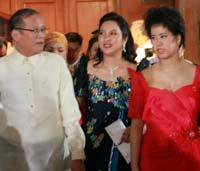The money of the people will be spent for the people.

Philippine President Benigno Aquino III has to wisely use public funds to improve people’s lives as he denounced wasteful spending of the past administration.
Aquino cited practices and transactions by the past government that did not benefit the public and only enriched officials closely allied with former president Gloria Macapagal Arroyo.
“Change can only come from our determination to stamp out extravagance and profligacy,” he said in his first state of the nation address, this week.
“Starting now, we will stop the wasteful use of government funds. We will eradicate projects that are wrong.”
In a litany of alleged irregularities unearthed by his cabinet so far, Aquino said only 6.5 per cent of the 2010 budget of 1.54 trillion pesos (33.47 billion dollars) was untouched by Arroyo.
Aquino took office at the end of June, having campaigned on the legacy of his beloved politician-parents. He ran on the slogan: “If there’s no corruption, there’s no poverty.”
He replaced Gloria Arroyo, who had reached her term limit and whose administration had been beset by allegations of corruption. Despite steady but slow economic growth under Ms. Arroyo, a third of the population lives on less than a dollar a day and the government suffers from chronic budget deficits.
The Arroyo administration also incurred debts of up to 177 billion pesos to fund rice imports that were beyond what was needed in 2004 and 2007, he added.
Aquino criticized executives at the state water agency for awarding themselves fat bonuses and cash incentives while retired employees have not received their pensions.
“The average worker receives up to 13 months of pay plus a cash gift,” he said. “But board members receive the equivalent of over 30 months pay if you include all their additional bonuses and allowances.”
Aquino said he would strive to minimize corruption and ensure transparency in all dealings by the government.
“In my administration, there will be no commissions, there will be no overpricing,” he said. “The money of the people will be spent for the people.”
Admitting that state funds were not enough to finance all public services and projects, Aquino said partnerships with the private sector would be strengthened to spur sustainable economic growth.
“I am heartened because many have already expressed renewed interest and confidence in the Philippines,” he said.
“There have already been many proposals from local and foreign investors to help provide much-needed funding for vital projects,” he said. “From these public-private partnerships our economy will grow and every Filipino will benefit.”
Aquino also vowed to cut red tape to improve the business climate for investors, build more classrooms, expand health-care coverage and modernize the military.
He called for the resumption of peace talks with Muslim and communist rebels and urged Congress to strengthen a law on witness protection to resolve political killings.
Meanwhile, about 85 percent of Filipinos trust President Aquino, the highest trust rating ever recorded by any individual included in trust probes by Pulse Asia, the pollster announced.
Pulse Asia’s latest trust survey, conducted from July 1 to 11, 2010, showed that Aquino’s trust rating surged by +18 percentage points between April and July 2010.
The survey firm said only a “negligible” percentage (2 percent) of respondents distrust the new President, while 13 percent are unable to say if they trust or distrust him.
Aquino enjoys basically the same trust ratings across the country’s geographic areas (83 percent to 89 percent) and socio-economic groupings (84 percent to 88 percent), Pulse Asia added.
Pulse Asia said selected appointments made by Aquino to key government positions are generally well-received by the public. At least half of respondents approve of all 11 presidential appointees included in the survey.
The highest level of approval is for Social Welfare and Development Secretary Dinky Soliman, who scored 72 percent. Justice Secretary Leila de Lima is at second with 69 percent, followed by Foreign Affairs Secretary Alberto Romulo and Philippine National Police chief Director General Jesus Versoza (67 percent each).
Near to small majorities approve of the appointments of Defense Secretary Voltaire Gazmin (50 percent), Presidential Adviser on the Pease Process Teresita Deles (51 percent), Finance Secretary Cesar Purisima (55 percent), Executive Secretary Paquito “Jojo” Ochoa (55 percent), Education Secretary Bro. Armin Luistro (58 percent), Budget Secretary Florencio “Butch” Abad (62 percent), and Armed Forces of the Philippines chief of staff Ric David (64 percent).
In addition, 22 percent to 36 percent of those aware of these selected presidential appointments cannot say if they approve or disapprove of Presidential Aquino’s choice for these government positions.
Pulse Asia said majority of Filipinos (85 percent) consider it of utmost importance for the new administration to implement measures to control the spiraling cost of goods and services.
Big majorities also deem it very important for the Aquino administration to not only make new pro-poor programs but also find ways to finance these (75 percent), as well as to create new jobs 73 percent).
Likewise, the following issues are also seen as being very important by near to small majorities of Filipinos:
• Appointing individuals with skills, experience and integrity to key government officials (60 percent);
• Preparing a program addressing the government’s fiscal and debt problems (59 percent);
• Continuing peace negotiations with armed political groups (56 percent);
• Forging a government of national unity (54 percent);
• Providing loans for small businesses and the self-employed (49 percent).
Pulse Asia’s survey was conducted using face-to-face interviews of 1,200 representative adults 18 years old and above. The poll has a ± 3 percent error margin at the 95 percent confidence level.






